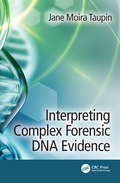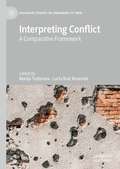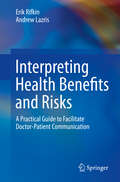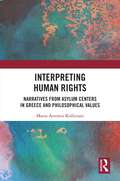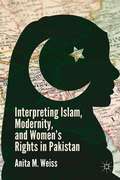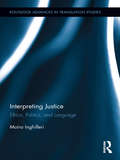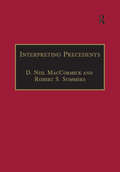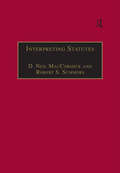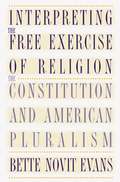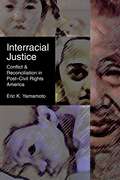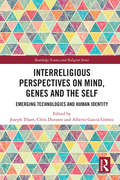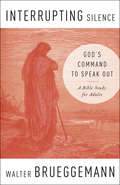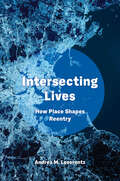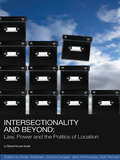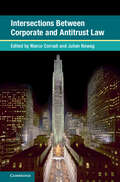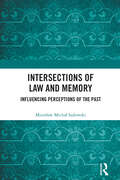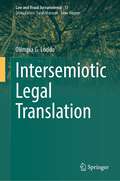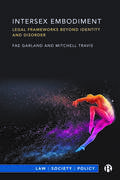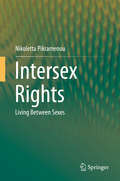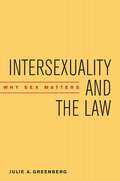- Table View
- List View
Interpreting Complex Forensic DNA Evidence
by Jane Moira TaupinInterpreting Complex Forensic DNA Evidence is a handy guide to recent advances—and emerging issues—in interpreting complex DNA evidence and profiles for use in criminal investigations. In certain cases, DNA cannot be connected to a specific biological material such as blood, semen or saliva. How or when the DNA was deposited may be an issue. However, the possibility of generating DNA profiles from touched objects, where there may not be a visible deposit, has expanded the scope and number of exhibits submitted for DNA analysis. With such advances, and increasing improvements in technological capabilities in testing samples, this means it is possible to detect ever smaller amounts of DNA. There are also many efforts underway to seek was to interpret DNA profiles that are sub-optimal—either relative to the amount required by the testing kit and, potentially, the quality of the obtained sample. Laboratories often use enhancements in order to obtain a readable DNA profile. The broad-reaching implications of improving DNA sensitivity have led to this next, emerging generation of more complex profiles. Examples partial profiles that do not faithfully reflect the proposed donor, or mixtures of partial DNA from multiple people. A complexity threshold has been proposed to limit interpretation of poor-quality data. Research is now addressing the interpretation of transfer of trace amounts of DNA. Complex issues are arising in trial that need to be reconciled as such complexity has added challenges to the interpretation of evidence and its introduction or dismissal in certain cases in the courts. Interpreting Complex Forensic DNA Evidence provides tools to assist the criminal investigator, forensic expert, and legal professional when posed with a DNA result in a forensic report or testimony. The result—and any associated statistic—may not reveal any ambiguity, complexity, or the assumptions involved in deriving it. Questions from resolved criminal cases are posed, and the relevant forensic literature, are provided for the reader to assess a DNA result and any associated statistic. Case studies included throughout illustrate concepts and emphasize the need for conclusions in the forensic report that are data-driven and supported by the data.
Interpreting Conflict: A Comparative Framework (Palgrave Studies in Languages at War)
by Marija Todorova Lucía Ruiz RosendoThis edited book examines the role of interpreting in conflict situations, bringing together studies from different international and intercultural contexts, with contributions from military personnel, humanitarian interpreters and activists as well as academics. The authors use case studies to compare relevant notions of interpreting in conflict-related scenarios such as: the positionality of the interpreter, the ethical, emotional and security implications of their work, the specific training needed to carry out work for military and humanitarian organizations, and the relations of power created between the different stakeholders. The book will be of interest to students and scholars of translation and interpreting, conflict and peace studies, as well as conflict resolution and management.
Interpreting Crimes in the Rome Statute of the International Criminal Court
by Leena GroverThe Rome Statute of the International Criminal Court defines more than ninety crimes that fall within the Court's jurisdiction: genocide, crimes against humanity, war crimes and aggression. How these crimes are interpreted contributes to findings of individual criminal liability, and moreover impacts upon the perceived legitimacy of the Court. And yet, to date, there is no agreed approach to interpreting these definitions. This book offers practitioners and scholars a guiding principle, arguments and aids necessary for the interpretation of international crimes. Leena Grover surveys the jurisprudence of the ICTY and ICTR before presenting a model of interpretive reasoning that integrates the guidance within the Rome Statute itself with Articles 31-33 of the Vienna Convention on the Law of Treaties.
Interpreting Health Benefits and Risks
by Erik Rifkin Andrew LazrisThis timely guide to communication in patient-centered medicine argues for greater clarity in explaining health risks versus benefits of an array of screening tests, procedures, and drug regimens. It reviews the growing trend toward patients' involvement in their own care, particularly in terms of chronic conditions, and details approaches physicians can use to prepare patients (and themselves) for collaborative decision-making based on informed choices and clear, meaningful knowledge. Chapters apply this lens to a wide range of common interventions as contentious as estrogen replacement therapy and antibiotics, and as widely prescribed as the daily aspirin and the annual physical. With this goal in mind, the authors also introduce an innovative decision-making tool that translates risks and benefits into a clear graphic format for fewer chances of miscommunication or misunderstanding. Among the topics covered: Involving the patient in decision making. Towards a universal decision aid. BRCT: the Benefit/Risk Characterization Theater. Breast Cancer Screening--Mammograms. Prostate Cancer Screening. Colon cancer screening with colonoscopy. Screening for and treating dementia. Statins, cholesterol, and coronary heart disease. Physicians in family and internal medicine will find Interpreting Health Benefits and Risks: A Practical Guide to Facilitate Doctor- Patient Communication a valuable resource for communicating with patients and new possibilities for working toward their better health and health education. This book considers several common and important situations where faulty decision-making makes overtreatment a serious risk. Clear, fair, referenced, and useful information is provided. And a powerful intuitive technique is introduced which allows patient and doctor to talk as equals as they work together in the exam room. The authors emphasize that some patients who have been fully educated will still accept high risks of harm for a small chance of avoiding premature death. But as this book is accepted and its ideas and technique are extended, I feel sure that net harm to patients will be curtailed. And what is more, the integrity of the decision-making process will be improved. --Thomas Finucane, MD, Professor of Medicine, Division of Gerontology and Geriatric Medicine, The Johns Hopkins University School of Medicine
Interpreting Human Rights: Narratives from Asylum Centers in Greece and Philosophical Values
by Maria-Artemis KolliniatiKolliniati’s groundbreaking book, Interpreting Human Rights: Narratives from Asylum Centers in Greece and Philosophical Values, challenges the notion that the interpretation and application of human rights primarily occur within the corridors of power in Strasbourg or official European institutions. It argues that such interpretation takes place in the grassroots settings of rural areas and neighborhoods, by actors who do not belong to the class of decision‑making elites.Focusing on the Aegean islands as exemplary sites of the European refugee crisis, this book draws on research conducted among local actors, including mayors, municipal councilors, representatives of NGOs and staff at refugee reception and identification centers. This book is divided into five distinctive sections: Methodology; Legal Framework and the Emergence of Hotspots; Empirical Research: Narratives of Local Actors; Local Narratives and Political Attitudes; and Glocalization of Human Rights. The study explores the role of human rights in narratives surrounding refugee flows, categorizing responses according to various political theory approaches such as global liberalism, egalitarianism, communitarianism and conservatism. By integrating applied political theory with localized human rights interpretations, this book offers actionable steps for addressing the challenges of migration in today’s interconnected world.By amplifying the voices of those directly engaged with one of contemporary Europe’s most significant challenges, Interpreting Human Rights will appeal to scholars of sociology, political theory, politics and international law, particularly those interested in migration, human rights and refugee studies.
Interpreting Islam, Modernity, And Women’s Rights In Pakistan
by Anita M. WeissIn Pakistan, myriad constituencies are grappling with reinterpreting women's rights. This book analyzes the Government of Pakistan's construction of an understanding of what constitutes women's rights, moves on to address traditional views and contemporary popular opinion on women's rights, and then focuses on three very different groups' perceptions of women's rights: progressive women's organizations as represented by the Aurat Foundation and Shirkat Gah; orthodox Islamist views as represented by the Jama'at-i-Islami, the MMA government in Khyber Pakhtunkhwa (2002-08) and al-Huda; and the Swat Taliban. Author Anita M. Weiss analyzes the resultant "culture wars" that are visibly ripping the country apart, as groups talk past one another - each confidant that they are the proprietors of culture and interpreters of religion while others are misrepresenting it.
Interpreting Justice: Ethics, Politics and Language (Routledge Advances in Translation and Interpreting Studies)
by Moira InghilleriIn this timely study, Inghilleri examines the interface between ethics, language, and politics during acts of interpreting, with reference to two particular sites of transnational conflict: the political and judicial context of asylum adjudication and the geo-political context of war. The book characterizes the social and moral spaces in which the translation of the spoken word occurs in ways that reflect the realities of the trans-nationally constituted, locally and globally informed environments in which interpreters work alongside others. One of the core arguments is that the rather restricted notion of neutrality that remains central to translator and interpreter practices does not adequately reflect the complex and paradoxical nature of these socially and politically inscribed encounters and others like them. This study offers an alternative theoretical perspective on language and ethics to those which have shaped and informed translation and interpreting theory and practice in recent years.
Interpreting Precedents: A Comparative Study (Applied Legal Philosophy #10)
by D. NEIL MacCORMICK AND ROBERT S. SUMMERSThis book contains a series of essays discussing the uses of precedent as a source of law and a basis for legal arguments in nine different legal systems, representing a variety of legal traditions. Precedent is fundamental to law, yet theoretical and ideological as well as legal considerations lead to its being differently handled and rationalised in different places. Out of the comparative study come the six theoretical and synoptic essays that conclude the volume.
Interpreting Statutes: A Comparative Study (Applied Legal Philosophy #23)
by D. Neil MacCormick Robert S. SummersThis book is a work of outstanding importance for scholars of comparative law and jurisprudence and for lawyers engaged in EC law or other international forms of practice. It reviews, compares and analyses the practice of interpretation in nine countries representing Europe as well as the US and Argentina in common and civil law; it also explores implications for general theories of interpretation and of justification. Its authors, who include Aulis Aarnio, Robert Alexy, Ralf Dreier, Enrique Zuleta-Puceiro, Michel Troper, Christophe Grzegorczyk, Jean-Louis Gardes, Enrico Pattaro, Michele Taruffo, Massimo La Torre, Jerry Wroblewski, Alexsander Peczenik, Gunnar Bergholtz and Zenon Bankowski, as well as editors Robert S. Summers and D. Neil MacCormick, constitute an international team of great distinction; they have worked on this project for over seven years.
Interpreting the Bible and the Constitution
by Jaroslav PelikanBoth the Bible and the Constitution have the status of "Great Code," but each of these important texts is controversial as well as enigmatic. They are asked to speak to situations that their authors could not have anticipated on their own. In this book, one of our greatest religious historians brings his knowledge of the history of biblical interpretation to bear on the question of constitutional interpretation. Jaroslav Pelikan compares the methods by which the official interpreters of the Bible and the Constitution - the Christian Church and the Supreme Court, respectively - have approached the necessity of interpreting, and reinterpreting, their important texts. In spite of obvious differences, both texts require close, word-by-word exegesis, an awareness of opinions that have gone before, and a willingness to ask new questions of old codes, Pelikan observes. He probes for answers to the question of what makes something authentically "constitutional" or "biblical," and he demonstrates how an understanding of either biblical interpretation or constitutional interpretation can illuminate the other in important ways. --BOOK JACKET. Title Summary field provided by Blackwell North America, Inc. All Rights Reserved
Interpreting the Free Exercise of Religion
by Bette Novit EvansA generation ago, all of the big questions concerning religious freedom in America seemed to have been resolved. At the very least, the lines of division between proponents of a wall of separation between church and state and advocates of religious accommodation seemed clearly drawn. Since then, increasing religious diversity and changing functions of government have raised new questions about what it means to allow the free exercise of religion. In this book, Bette Novit Evans explores the contemporary understandings of this First Amendment guarantee in all of its complexity and ambiguity. Evans situates constitutional arguments about free exercise within the context of theological and sociological insights about American religious experience. She surveys and evaluates several of the most well considered approaches to religious freedom and applies them to contemporary legal controversies, examining problems in defining religion and claims concerning the autonomy of religious institutions. Her conclusions about religious liberty are embedded in an appreciation of American pluralism: the guarantee of religious freedom, she argues, can be understood as an instrument for fostering alternative sources of meaning within a pluralistic political community.
Interracial Justice: Conflict and Reconciliation in Post–Civil Rights America (Critical America #1)
by Eric K. YamamotoThe United States in the twenty-first century will be a nation of so-called minorities. Shifts in the composition of the American populace necessitate a radical change in the ways we as a nation think about race relations, identity, and racial justice. Once dominated by black-white relations, discussions of race are increasingly informed by an awareness of strife among nonwhite racial groups. While white influence remains important in nonwhite racial conflict, the time has come for acknowledgment of ways communities of color sometimes clash, and their struggles to heal the resulting wounds and forge strong alliances. Melding race history, legal theory, theology, social psychology, and anecdotes, Eric K. Yamamoto offers a fresh look at race and responsibility. He tells tales of explosive conflicts and halting conciliatory efforts between African Americans and Korean and Vietnamese immigrant shop owners in Los Angeles and New Orleans. He also paints a fascinating picture of South Africa's controversial Truth and Reconciliation Commission as well as a pathbreaking Asian American apology to Native Hawaiians for complicity in their oppression. An incisive and original work by a highly respected scholar, Interracial Justice greatly advances our understanding of conflict and healing through justice in multiracial America.
Interreligious Perspectives on Mind, Genes and the Self: Emerging Technologies and Human Identity (Routledge Science and Religion Series)
by Joseph Tham Chris Durante Alberto García GómezAttitudes towards science, medicine and the body are all profoundly shaped by people’s worldviews. When discussing issues of bioethics, religion often plays a major role. In this volume, the role of genetic manipulation and neurotechnology in shaping human identity is examined from multiple religious perspectives. This can help us to understand how religion might affect the impact of the initiatives such as the UNESCO Declaration in Bioethics and Human Rights. The book features bioethics experts from six major religions: Buddhism, Confucianism, Christianity, Islam, Hinduism, and Judaism. It includes a number of distinct religious and cultural views on the anthropological, ethical and social challenges of emerging technologies in the light of human rights and in the context of global bioethics. The contributors work together to explore issues such as: cultural attitudes to gene editing; neuroactive drugs; the interaction between genes and behaviours; the relationship between the soul, the mind and DNA; and how can clinical applications of these technologies benefit the developing world. This is a significant collection, demonstrating how religion and modern technologies relate to one another. It will, therefore, be of great interest to academics working in bioethics, religion and the body, interreligious dialogue, and religion and science, technology and neuroscience.
Interrupting Silence: God's Command To Speak Out
by Walter BrueggemannSilence is a complex matter. It can refer to awe before unutterable holiness, but it can also refer to the coercion where some voices are silenced in the interest of control by the dominant voices. It is the latter silence that Walter Brueggemann explores, urging us to speak up in situations of injustice. <P><P>Interrupting Silence illustrates that the Bible is filled with stories where marginalized people break repressive silence and speak against it. Examining how maintaining silence allows the powerful to keep control, Brueggemann motivates readers to consider situations in their lives where they need to either interrupt silence or be part of the problem, convincing us that God is active and wanting us to act for justice.
Intersecting Lives: How Place Shapes Reentry
by Andrea M. LeverentzFew would disagree that neighborhood and place are important dimensions of reentry from prison, but we have a less clear sense of why or how they matter—and we rarely get a view of the lived social-interactional dynamics between people returning from incarceration and receiving communities. Intersecting Lives focuses on the processes by which neighborhood and place influence reentry experiences and how these shape community life. Through interviews and ethnographic observations, Andrea M. Leverentz brings readers into three very different Boston communities. These places and the interactions they foster shape reentry outcomes, including reoffending, surveillance, relationship formation, and access to opportunities. This book sheds crucial new light on the processes of reentry and desistance, tying them intimately to space and community, including dynamics around race, gender, gentrification, homelessness, and transportation.
Intersectionality and Beyond: Law, Power and the Politics of Location (Social Justice)
by Davina Cooper Emily Grabham Didi Herman Jane KrishnadasThis collection addresses the present and the future of the concept of intersectionality within socio-legal studies. Intersectionality provides a metaphorical schema for understanding the interaction of different forms of disadvantage, including race, sexuality, and gender. But it also goes further to provide a particular model of how these aspects of social identity and location converge – whether at the level of subjectivity, everyday life, in culture or in the institutional practices of state and other bodies. Including contributions from a range of international scholars, this book interrogates what has become a key organizing concept across a range of disciplines, most particularly law, political theory, and cultural studies.
Intersections Between Corporate and Antitrust Law (Global Competition Law and Economics Policy)
by Julian Nowag Marco CorradiRecent public debate on common ownership by institutional investors has brought awareness to one of the many intersections between the corporate and antitrust worlds. But the interplay between these two fields dates back to the dawn of US antitrust. This volume shines a light on the often underplayed and misunderstood connections between antitrust and corporate law and finance. It offers a multi-disciplinary perspective on highly trending issues, such as parallel equity holdings, interlocking directorships, the anticompetitive effects of certain corporate governance arrangements, and the relationships between ESG and not-for profit activities with antitrust law. This edited collection brings together leading experts from across the US, Europe, and Asia and provides a cross-border perspective on alternative policy approaches for the field.
Intersections of Law and Memory: Influencing Perceptions of the Past
by Mirosław Michał SadowskiThis book elaborates a new framework for considering and understanding the relationship between law and memory.How can law influence collective memory? What are the mechanisms law employs to influence social perceptions of the past? And how successful is law in its attempts to rewrite narratives about the past? As the field of memory studies has grown, this book takes a step back from established transitional justice narratives, returning to the core sociological, philosophical and legal theoretical issues that underpin this field. The book then goes on to propose a new approach to the relationship between law and collective memory based on a conception of ‘legal institutions of memory’. It then elaborates the functioning of such institutions through a range of examples – taken from Japan, Iraq, Brazil, Portugal, Rwanda and Poland – that move from the work of international tribunals and truth commissions to more explicit memory legislation. The book concludes with a general assessment of the contemporary intersections of law and memory, and their legal institutionalisation.This book will be of interest to scholars with relevant interests in the sociology of law, legal theory and international law, as well as in sociology and politics.
Intersemiotic Legal Translation (Law and Visual Jurisprudence #11)
by Olimpia G. LoddoThe translation of legal documents in today’s globally interconnected world calls for novel approaches to overcoming traditional language barriers. The verbal language used in legal documents can be accompanied or even replaced by various types of semiotic resource, such as symbols, diagrams, and icons, while the advancement of digital tools and the introduction of new technologies offer those drafting contracts and other legal documents access to an ever-expanding toolbox for the translation process.This book makes a significant contribution to the existing literature on legal translation and intersemiotic translation by sharing valuable insights and opening up new avenues of inquiry, fostering further exploration of this evolving domain and enabling practitioners to use these diverse communication tools responsibly and effectively.Given the book’s structured multidisciplinary approach and extensive analyses of the characteristics of intersemiotic legal translation, its potential, and the complexities that arise at the intersection of law, language, and semiotics, it will appeal to legal practitioners, translators, semiotic scholars, and legal philosophers alike.Whether you are a legal professional aiming to expand your expertise, an academic seeking a new research direction, or are simply intrigued by the fascinating interplay of law, language, and semiotics, this book offers a valuable resource that sheds light on the unique dynamics of translating legal concepts using approaches other than traditional verbal communication. As such, it is an essential read for anyone who is interested in the changing landscape of law, language, and translation.
Intersex Embodiment: Legal Frameworks beyond Identity and Disorder (Law, Society, Policy)
by Mitchell Travis Fae GarlandThis book examines the divergent medical, political and legal constructions of intersex. The authors use empirical data to explore how intersex people are embodied through these frameworks which in turn influence their lived experiences. Through their analysis, the authors reveal the factors that motivate and influence the way in which policy makers and legislators approach the area of intersex rights. They reflect on the limitations of law as the primary vehicle in challenging healthcare’s framing of intersex as a ‘disorder’ in need of fixing. Finally, they offer a more holistic account of intersex justice which is underpinned by psychosocial support and bodily integrity.
Intersex Rights: Living Between Sexes
by Nikoletta PikramenouThis book addresses intersex rights violations and analyses intersex people’s legal demands as expressed by intersex activists themselves and delivered through statements and reports issued by intersex rights organisations, the United Nations and the Council of Europe. Intersex people are born with sex characteristics that do not fit typical notions of male or female bodies, as a result of which they are stigmatised, marginalised and denied the recognition of their fundamental rights. Often, they are subjected to involuntary and harmful sex “normalising” surgeries at birth, which violate their bodily integrity, self-determination and informed consent, so as to comply with societal and legal norms.Moreover, binary legal frameworks prevent them from enjoying the rights to access identification documents, start a family, or be free from discrimination in all areas including employment and sports. To elaborate on intersex violations that emanate from binary laws, this book examines the situation of intersex rights in regional jurisdictions worldwide and within the European Union in particular. In the process, it identifies current legal barriers and suggests how intersex people could be accommodated under legal frameworks and achieve sex/gender equality beyond binary definitions.
Intersexuality and the Law: Why Sex Matters
by Julie A. GreenbergWinner of the 2013 Bullough Award presented by the Foundation for the Scientific Study of Sexuality The term “intersex” evokes diverse images, typically of people who are both male and female or neither male nor female. Neither vision is accurate. The millions of people with an intersex condition, or DSD (disorder of sex development), are men or women whose sex chromosomes, gonads, or sex anatomy do not fit clearly into the male/female binary norm. Until recently, intersex conditions were shrouded in shame and secrecy: many adults were unaware that they had been born with an intersex condition and those who did know were advised to hide the truth. Current medical protocols and societal treatment of people with an intersex condition are based upon false stereotypes about sex, gender, sexual orientation, gender identity, and disability, which create unique challenges to framing effective legal claims and building a strong cohesive movement. In Intersexuality and the Law, Julie A. Greenberg examines the role that legal institutions can play in protecting the rights of people with an intersex condition. She also explores the relationship between the intersex movement and other social justice movements that have effectively utilized legal strategies to challenge similar discriminatory practices. She discusses the feasibility of forming effective alliances and developing mutually beneficial legal arguments with feminists, LGBT organizations, and disability rights advocates to eradicate the discrimination suffered by these marginalized groups.
Interspecies Ethics
by Cynthia WillettInterspecies Ethics explores animals' vast capacity for agency, justice, solidarity, humor, and communication across species.
Interspecies Ethics
by Cynthia WillettInterspecies Ethics explores animals' vast capacity for agency, justice, solidarity, humor, and communication across species.
Interspecies Ethics
by Cynthia WillettInterspecies Ethics explores animals' vast capacity for agency, justice, solidarity, humor, and communication across species.
